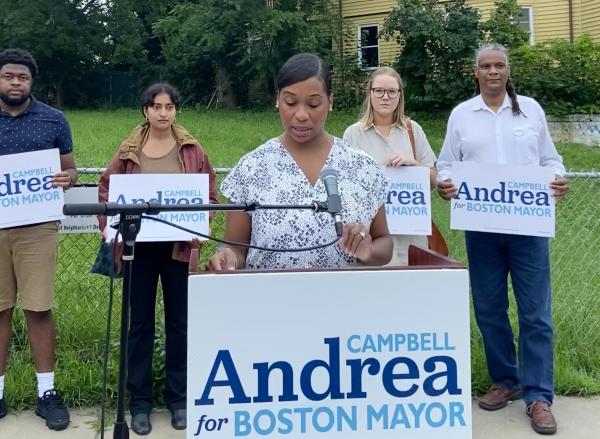July 14, 2021

Mayoral candidate Andrea Campbell pushed her affordable housing plan alongside supporters at a vacant lot on Blue Hill Avenue. The plan centers on the redevelopment of vacant and underutilized lots. (Photo: Rebeca Pereira)
Andrea Campbell, as she seeks to stand out in a field of five mayoral candidates, on Wednesday promoted a plan to speed up affordable housing development and close the racial wealth gap.
Joined by supporters at a vacant lot at the corner of Blue Hill Avenue and Floyd Street, Campbell spotlighted her plan to “activate” 100 vacant city-owned lots for affordable, mixed-use development within her first 100 days as mayor.
Housing is a top issue for Boston voters, according to a June poll from the Boston Globe and Suffolk University. Acting Mayor Kim Janey and City Councillor At-Large Michelle Wu topped the poll, which showed many voters remain undecided. City Councillor At-Large Annissa Essaibi George and Campbell, the District 4 councillor came next in the poll, followed by state Rep. Jon Santiago, who dropped out of the race this week, and John Barros, a former economic development official.
“Housing affordability is the single biggest issue Bostonians are worried about,” Campbell said. “Providing the leadership, vision and management necessary to transform housing in Boston must be our next mayor’s top priority.”
Barros has touted his record in support of affordable housing while he worked for former Mayor Marty Walsh, while Wu has said she is the only candidate who supports a return to rent control. Essaibi George has said increasing housing supply is a priority. Janey has said as acting mayor she put $50 million toward rent relief for residents amid the pandemic.
Campbell has previously focused on vacant lots as a district councillor representing Dorchester and Mattapan. In 2019, Campbell partnered with Wentworth Institute of Technology and a host of community members, engineers, and designers during a 24-hour “Reclaiming Space” workshop to generate practical fixes to blighted or underutilized parcels.
Solutions ran the gamut from transit-centered gardens to flexible apprenticeship spaces and mixed-use, youth-oriented hubs. The workshop sought to breathe life into the Blue Hill Ave. Action Plan, an initiative to reclaim and redevelop 30 vacant lots along the Blue Hill Ave. corridor with affordable housing in mind.
“This plan essentially builds on the work that I’ve already been doing on behalf of the residents in district four, and I would make sure that these lots were used for housing and mixed-used development, that will be affordable for those who live here, create local jobs, and provide ownership opportunities for residents,” said Campbell.
“I am frankly proud that I know I am the only candidate in this race that has a housing plan that is specific, that is practical, that is doable, that is creative, and that builds on a long record of accomplishment that is quite specific,” she added.
Campbell’s proposal also included a number of secondary priorities, including reforming permitting, processing, and zoning procedures.
Developers face notoriously protracted permitting and processing approval processes, and larger established development corporations often outflank smaller competitors in the RFP bidding process.
Campbell’s plan would favor small and mid-level developers, and it would seek to further cut through the bureaucratic morass surrounding developments by removing affordable housing from the purview of the Boston Planning and Development Agency (BPDA), a city agency.
“We’ve heard it is too time-consuming and too costly to build in the city of Boston. We, of course, want to make sure that these lots are activated quickly,” said Campbell. “As mayor, I will get creative, cut red tape and streamline development processes to accelerate the creation of affordable housing.”
Topics:



